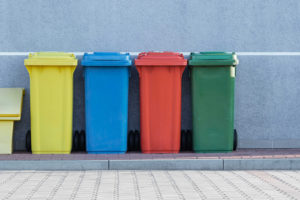 As the new year rolls around, it’s inevitably time to think about the changes that you want to make in your life. Whether or not you strictly prescribe to a New Year’s Resolution, or use the new year as just another point in your ongoing quest for personal or professional growth, one area of your life that can always use a push in the right direction is your waste recycling habits.
As the new year rolls around, it’s inevitably time to think about the changes that you want to make in your life. Whether or not you strictly prescribe to a New Year’s Resolution, or use the new year as just another point in your ongoing quest for personal or professional growth, one area of your life that can always use a push in the right direction is your waste recycling habits.
Even in the past few decades, the way we handle our waste, and the thinking behind the choices we make as consumers, has radically improved. Recycling programs and initiatives are widespread, if not universal, across North America. Composting, and other forms of organic waste disposal like bokashi fermentation, have gone from being viewed as the domain of ‘tree-hugging hippies’ to being central to municipal and corporate waste recycling strategies.
Companies are also considering the ‘afterlife’ of the packaging that they create for their products. This mindset has led to a proliferation of ‘low or no waste’ stores, where consumers are encouraged to bring in their own reusable bags and containers, to cut down on the impact of consumption. With all of these innovative new ways to handle the impact that the things we consume makes on our planet, now is the perfect time to turn your focus to better waste recycling habits. Here are three tips for how you can do just that.
- Prioritize Sorting Your Recycling and Waste: One of the main drawbacks from recycling is having to dig through a bag or bin of sticky, smelly containers, to sort them into the proper categories. An excellent way to keep this situation out of your life is to keep a bin for each category that your city or town recycles under your sink, so that you can sort as the opportunity arises, making the process gradual rather than tedious. Before sorting your recyclables, also make sure that you wash out anything plastic, glass, or metal, to prevent nasty smells and sticky residue.
- Find A ‘Low or No Waste’ Store Near You: These stores, usually selling food, cleaning supplies, or other bulk items, are one of the biggest responses to the growing public sentiment that plastic packaging is no longer acceptable. In order to reduce the amount of plastic that ends up in our landfills, and inevitably the natural environment, these stores encourage shoppers to bring their own reusable containers, or buy these containers from the store, and fill them with whatever the customer needs. This can eliminate plastic bags, containers, bottles, and many other types of waste from your life, while also saving you money.
- Try Bokashi Fermentation For Your Organic Waste Disposal: While composting has taken off in popularity in recent years, there is another, more effective, more sustainable way to handle organic waste. Bokashi fermentation is a revolutionary natural process that taps into the organic microflora in soil to break down organic waste without producing heat, greenhouse gases, or composting smells. Whether you’re a home gardener or industrial agriculturalist, bokashi fermentation helps you handle waste, while also converting it into useful nutrition for your crops, all in just a few weeks.
If you’re interested in adding bokashi fermentation to your waste recycling ritual this year, check out the Bokashicycle online store, for products covering the whole range of bokashi fermentation applications.
